Advertisements
Chapters
![NCERT solutions for Mathematics [English] Class 6 chapter 4 - Basic Geometrical Ideas NCERT solutions for Mathematics [English] Class 6 chapter 4 - Basic Geometrical Ideas - Shaalaa.com](/images/mathematics-english-class-6_6:0797baf62bd6489d8c888098e76ae949.jpg)
Advertisements
Solutions for Chapter 4: Basic Geometrical Ideas
Below listed, you can find solutions for Chapter 4 of CBSE NCERT for Mathematics [English] Class 6.
NCERT solutions for Mathematics [English] Class 6 4 Basic Geometrical Ideas Exercise 4.1 [Pages 74 - 75]
Use the figure to name Five points.
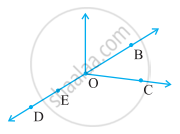
Use the figure to name the A line.

Use the figure to name Four rays.

Use the figure to name Five line segments.

Name the line given in all possible (twelve) ways, choosing only two letters at a time from the four given.

Use the figure to name:
Line containing point E.
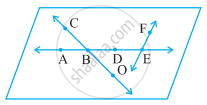
Use the figure to name:
Line passing through A.

Use the figure to name:
Line on which O lies.

Use the figure to name:
Two pairs of intersecting lines.

How many lines can pass through one given point?
How many lines can pass through two given points?
Draw a rough figure and label it suitably in the following case:
Point P lies on `overline"AB"`.
Draw a rough figure and label it suitably in the following case:
\[\overleftrightarrow{XY}\] and \[\overleftrightarrow{PQ}\] intersect at M.
Draw a rough figure and label it suitably in the following case:
Line l contains E and F but not D.
Draw a rough figure and label it suitably in the following case:
\[\overleftrightarrow{OP}\] and \[\overleftrightarrow{OQ}\] meet at O.
Consider the following figure of line \[\overleftrightarrow{MN}\]. Say whether the following statement is true or false in the context of the given figure.
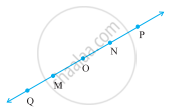
Q, M, O, N, and P are points on the line \[\overleftrightarrow{MN}\].
True
False
Consider the following figure of line \[\overleftrightarrow{MN}\]. Say whether the following statement is true or false in the context of the given figure.

M, O, and N are points on a line segment `overline("MN")`.
True
False
Consider the following figure of line \[\overleftrightarrow{MN}\]. Say whether the following statement is true or false in the context of the given figure.

M and N are the end points of line segment `overline"MN"`.
True
False
Consider the following figure of line \[\overleftrightarrow{MN}\]. Say whether the following statement is true or false in the context of the given figure.

O and N are end points of line segment `overline"OP"`.
True
False
Consider the following figure of line \[\overleftrightarrow{MN}\]. Say whether the following statement is true or false in the context of the given figure.

M is one of the end points of line segment `overline"QO"`.
True
False
Consider the following figure of line \[\overleftrightarrow{MN}\]. Say whether the following statement is true or false in the context of the given figure.

M is the point on ray `vec"OP"`.
True
False
Consider the following figure of line \[\overleftrightarrow{MN}\]. Say whether the following statement is true or false in the context of the given figure.

Ray `vec("OP")` is different from ray `vec("QP")`.
True
False
Consider the following figure of line \[\overleftrightarrow{MN}\]. Say whether the following statement is true or false in the context of the given figure.

Ray `vec("OP")` is the same as ray `vec("OM")`.
True
False
Consider the following figure of line \[\overleftrightarrow{MN}\]. Say whether the following statement is true or false in the context of the given figure.

Ray `vec("OM")` is not opposite to ray `vec("OP")`.
True
False
Consider the following figure of line \[\overleftrightarrow{MN}\]. Say whether the following statement is true or false in the context of the given figure.

O is not an initial point of `vec("OP")`.
True
False
Consider the following figure of line \[\overleftrightarrow{MN}\]. Say whether the following statement is true or false in the context of the given figure.

N is the initial point of `vec("NP")` and `vec("NM")`.
True
False
NCERT solutions for Mathematics [English] Class 6 4 Basic Geometrical Ideas Exercise 4.2 [Page 78]
Classify the following curve as Open or Closed.

Open
Closed
Classify the following curve as Open or Closed.

Open
Closed
Classify the following curve as Open or Closed.

Open
Closed
Classify the following curve as Open or Closed.

Open
Closed
Classify the following curve as Open or Closed.

Open
Closed
Draw a rough diagram to illustrate the following:
Open curve
Draw a rough diagram to illustrate the following:
Closed curve
Draw any polygon and shade it's interior.
Consider the given figure and answer the question:
Is it a curve?

Yes
No
Consider the given figure and answer the question:
Is it closed?

Yes
No
Illustrate, if possible the following with a rough diagram:
A closed curve that is not a polygon.
Illustrate, if possible the following with a rough diagram:
An open curve is made up entirely of line segments.
Illustrate, if possible the following with a rough diagram:
A polygon with two sides.
NCERT solutions for Mathematics [English] Class 6 4 Basic Geometrical Ideas Exercise 4.3 [Page 80]
Name the angles in the given figure.
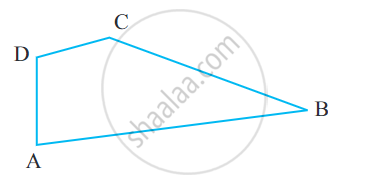
In the given diagram, name the point.
In the interior of ∠DOE
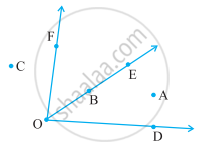
In the given diagram, name the point.
In the exterior of ∠EOF

In the given diagram, name the point.
On ∠EOF

Draw a rough diagram of two angles such that they have One point in common.
Draw a rough diagram of two angles such that they have Two points in common.
Draw a rough diagram of two angles such that they have Three points in common.
Draw a rough diagram of two angles such that they have Four points in common.
Draw a rough diagram of two angles such that they have One ray in common.
NCERT solutions for Mathematics [English] Class 6 4 Basic Geometrical Ideas Exercise 4.4 [Page 81]
Draw a rough sketch of a triangle ABC. Mark a point P in its interior and a point Q in its exterior. Is point A in its exterior or in its interior?
Identify three triangles in the figure.

Write the names of seven angles.

Write the names of six line segments.

Which two triangles have ∠B in common?

NCERT solutions for Mathematics [English] Class 6 4 Basic Geometrical Ideas Exercise 4.5 [Page 82]
Draw a rough sketch of a quadrilateral PQRS. Draw its diagonals. Name them. Is the meeting point of the diagonals in the interior or exterior of the quadrilateral?
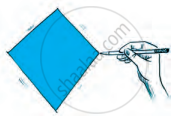
Draw a rough sketch of a quadrilateral KLMN. State two pairs of opposite sides.
Draw a rough sketch of a quadrilateral KLMN. State two pairs of opposite angles.
Draw a rough sketch of a quadrilateral KLMN. State two pairs of adjacent sides.
Draw a rough sketch of a quadrilateral KLMN. State two pairs of adjacent angles.
Investigate :
Use strips and fasteners to make a triangle and a quadrilateral.
Try to push inward at any one vertex of the triangle. Do the same to the quadrilateral. Is the triangle distorted? Is the quadrilateral distorted? Is the triangle rigid?
Why is it that structures like electric towers make use of triangular shapes and not quadrilaterals?
NCERT solutions for Mathematics [English] Class 6 4 Basic Geometrical Ideas Exercise 4.6 [Page 84]
From the figure, identify the centre of the circle.
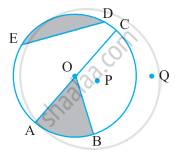
From the figure, identify three radii.
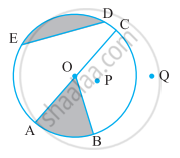
From the figure, identify a diameter.
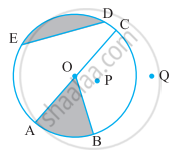
From the figure, identify a chord.
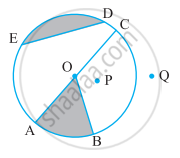
From the figure, identify two points in the interior.

From the figure, identify a point in the exterior.

From the figure, identify a sector.

From the figure, identify a segment.

Is every diameter of a circle also a chord?
Yes
No
Is every chord of a circle also a diameter?
Yes
No
Draw any circle and mark
- it's centre
- a radius
- a diameter
- a sector
- a segment
- a point in its interior
- a point in its exterior
- an arc
Say true or false:
Two diameters of a circle will necessarily intersect.
True
False
Say true or false:
The centre of a circle is always in its interior.
True
False
Solutions for 4: Basic Geometrical Ideas
![NCERT solutions for Mathematics [English] Class 6 chapter 4 - Basic Geometrical Ideas NCERT solutions for Mathematics [English] Class 6 chapter 4 - Basic Geometrical Ideas - Shaalaa.com](/images/mathematics-english-class-6_6:0797baf62bd6489d8c888098e76ae949.jpg)
NCERT solutions for Mathematics [English] Class 6 chapter 4 - Basic Geometrical Ideas
Shaalaa.com has the CBSE Mathematics Mathematics [English] Class 6 CBSE solutions in a manner that help students grasp basic concepts better and faster. The detailed, step-by-step solutions will help you understand the concepts better and clarify any confusion. NCERT solutions for Mathematics Mathematics [English] Class 6 CBSE 4 (Basic Geometrical Ideas) include all questions with answers and detailed explanations. This will clear students' doubts about questions and improve their application skills while preparing for board exams.
Further, we at Shaalaa.com provide such solutions so students can prepare for written exams. NCERT textbook solutions can be a core help for self-study and provide excellent self-help guidance for students.
Concepts covered in Mathematics [English] Class 6 chapter 4 Basic Geometrical Ideas are Concept for Basic Geometrical Ideas (2 -d), Concept of Points, Concept of Line, Concept of Line Segment, Concept of Ray, Concept of Intersecting Lines, Introduction to Parallel Lines, Concept of Curves, Different Types of Curves - Closed Curve, Open Curve, Simple Curve., Concept of Angle, Concept of Polygons, Concept of Triangles, Concept of Quadrilaterals, Concept of Circle, Concept for Basic Geometrical Ideas (2 -d), Concept of Points, Concept of Line, Concept of Line Segment, Concept of Ray, Concept of Intersecting Lines, Introduction to Parallel Lines, Concept of Curves, Different Types of Curves - Closed Curve, Open Curve, Simple Curve., Concept of Angle, Concept of Polygons, Concept of Triangles, Concept of Quadrilaterals, Concept of Circle.
Using NCERT Mathematics [English] Class 6 solutions Basic Geometrical Ideas exercise by students is an easy way to prepare for the exams, as they involve solutions arranged chapter-wise and also page-wise. The questions involved in NCERT Solutions are essential questions that can be asked in the final exam. Maximum CBSE Mathematics [English] Class 6 students prefer NCERT Textbook Solutions to score more in exams.
Get the free view of Chapter 4, Basic Geometrical Ideas Mathematics [English] Class 6 additional questions for Mathematics Mathematics [English] Class 6 CBSE, and you can use Shaalaa.com to keep it handy for your exam preparation.
